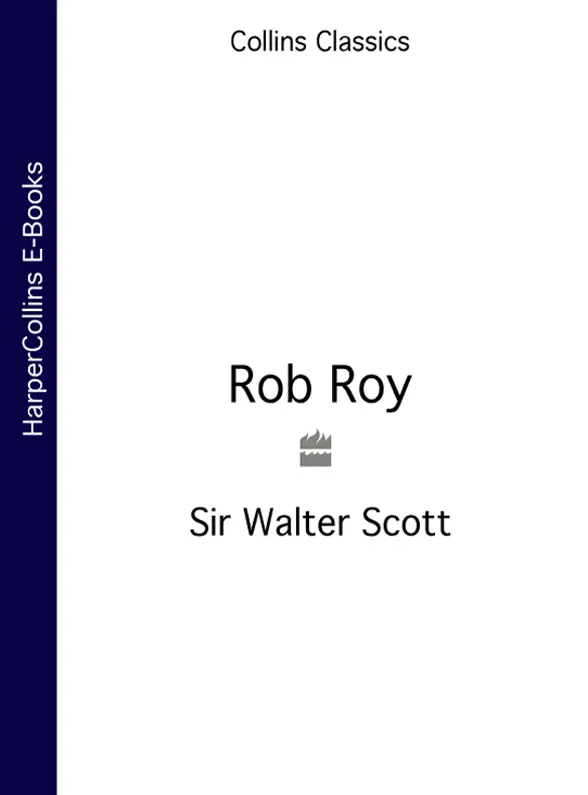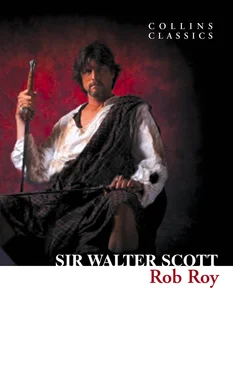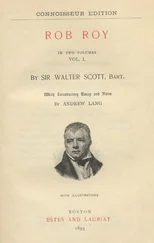
Cover
Title Page ROB ROY Sir Walter Scott
Volume 1
Advertisement to the First Edition
Introduction – (1829)
Appendix to Introduction
No. II. – Letters
Copy of Grahame of Killearn’s Letter, Enclosed In the Preceding
The Duke of Montrose to – –
No. III. – Challenge By Rob Roy
No. IV. – Letter
No. IVa. – Letter
No. V. – Highland Wooing
No. VI – Ghlune Dhu
Editor’s Introduction to Rob Roy
Chapter 1
Chapter 2
Chapter 3
Chapter 4
Chapter 5
Chapter 6
Chapter 7
Chapter 8
Chapter 9
Chapter 10
Chapter 11
Chapter 12
Chapter 13
Chapter 14
Chapter 15
Chapter 16
Chapter 17
Volume 2
Chapter 1
Chapter 2
Chapter 3
Chapter 4
Chapter 5
Chapter 6
Chapter 7
Chapter 8
Chapter 9
Chapter 10
Chapter 11
Chapter 12
Chapter 13
Chapter 14
Chapter 15
Chapter 16
Chapter 17
Chapter 18
Chapter 19
Chapter 20
Chapter 21
Chapter 22
Postscript.
State Paper Office.
Notes to Rob Roy.
Note A. – The Grey Stone of MacGregor.
Note B. – Dugald Ciar Mhor.
Note C. – The Loch Lomond Expedition.
Note D. – Author’s Expedition against the maclarens.
Note E. – Allan Breck Stewart.
Note F. – The Abbess of Wilton.
Note G. – Mons Meg.
Note H. – Fairy Superstition.
Note I. – Clachan of Aberfoil.
Classic Literature: Words and Phrases Adapted from the collins english dictionary
About the Author
History of Collins
Copyright
About the Publisher
For why? Because the good old rule
Sufficeth them; the simple plan,
That they should take who have the power,
And they should keep who can.
Rob Roy’s Grave – Wordsworth
ADVERTISEMENT TO THE FIRST EDITION
When the Editor of the following volumes published, about two years since, the work called the “Antiquary,” he announced that he was, for the last time, intruding upon the public in his present capacity. He might shelter himself under the plea that every anonymous writer is, like the celebrated Junius, only a phantom, and that therefore, although an apparition, of a more benign, as well as much meaner description, he cannot be bound to plead to a charge of inconsistency. A better apology may be found in the imitating the confession of honest Benedict, that, when he said he would die a bachelor, he did not think he should live to be married. The best of all would be, if, as has eminently happened in the case of some distinguished contemporaries, the merit of the work should, in the reader’s estimation, form an excuse for the Author’s breach of promise. Without presuming to hope that this may prove the case, it is only further necessary to mention, that his resolution, like that of Benedict, fell a sacrifice, to temptation at least, if not to stratagem.
It is now about six months since the Author, through the medium of his respectable Publishers, received a parcel of Papers, containing the Outlines of this narrative, with a permission, or rather with a request, couched in highly flattering terms, that they might be given to the Public, with such alterations as should be found suitable. *
These were of course so numerous, that, besides the suppression of names, and of incidents approaching too much to reality, the work may in a great measure be, said to be new written. Several anachronisms have probably crept in during the course of these changes; and the mottoes for the Chapters have been selected without any reference to the supposed date of the incidents. For these, of course, the Editor is responsible. Some others occurred in the original materials, but they are of little consequence. In point of minute accuracy, it may be stated, that the bridge over the Forth, or rather the Avondhu (or Black River), near the hamlet of Aberfoil, had not an existence thirty years ago. It does not, however, become the Editor to be the first to point out these errors; and he takes this public opportunity to thank the unknown and nameless correspondent, to whom the reader will owe the principal share of any amusement which he may derive from the following pages.
1st December 1817.
* As it may be necessary, in the present Edition (1829), to speak upon the square, the Author thinks it proper to own, that the communication alluded to is entirely imaginary.
When the author projected this further encroachment on the patience of an indulgent public, he was at some loss for a title; a good name being very nearly of as much consequence in literature as in life. The title of Rob Roy was suggested by the late Mr. Constable, whose sagacity and experience foresaw the germ of popularity which it included.
No introduction can be more appropriate to the work than some account of the singular character whose name is given to the title-page, and who, through good report and bad report, has maintained a wonderful degree of importance in popular recollection. This cannot be ascribed to the distinction of his birth, which, though that of a gentleman, had in it nothing of high destination, and gave him little right to command in his clan. Neither, though he lived a busy, restless, and enterprising life, were his feats equal to those of other freebooters, who have been less distinguished. He owed his fame in a great measure to his residing on the very verge of the Highlands, and playing such pranks in the beginning of the 18th century, as are usually ascribed to Robin Hood in the middle ages, – and that within forty miles of Glasgow, a great commercial city, the seat of a learned university. Thus a character like his, blending the wild virtues, the subtle policy, and unrestrained license of an American Indian, was flourishing in Scotland during the Augustan age of Queen Anne and George I. Addison, it is probable, or Pope, would have been considerably surprised if they had known that there existed in the same island with them a personage of Rob Roy’s peculiar habits and profession. It is this strong contrast betwixt the civilised and cultivated mode of life on the one side of the Highland line, and the wild and lawless adventures which were habitually undertaken and achieved by one who dwelt on the opposite side of that ideal boundary, which creates the interest attached to his name. Hence it is that even yet,
Far and near, through vale and hill,
Are faces that attest the same,
And kindle like a fire new stirr’d,
At sound of Rob Roy’s name.
There were several advantages which Rob Roy enjoyed for sustaining to advantage the character which he assumed.
The most prominent of these was his descent from, and connection with, the clan MacGregor, so famous for their misfortunes, and the indomitable spirit with which they maintained themselves as a clan, linked and banded together in spite of the most severe laws, executed with unheard-of rigour against those who bore this forbidden surname. Their history was that of several others of the original Highland clans, who were suppressed by more powerful neighbours, and either extirpated, or forced to secure themselves by renouncing their own family appellation, and assuming that of the conquerors. The peculiarity in the story of the MacGregors, is their retaining, with such tenacity, their separate existence and union as a clan under circumstances of the utmost urgency. The history of the tribe is briefly as follows. But we must premise that the tale depends in some degree on tradition; therefore, excepting when written documents are quoted, it must be considered as in some degree dubious.
Читать дальше












